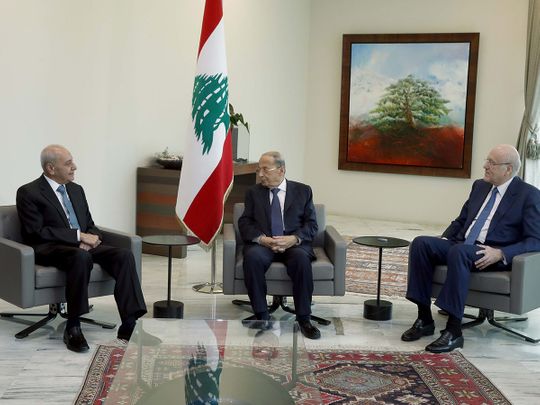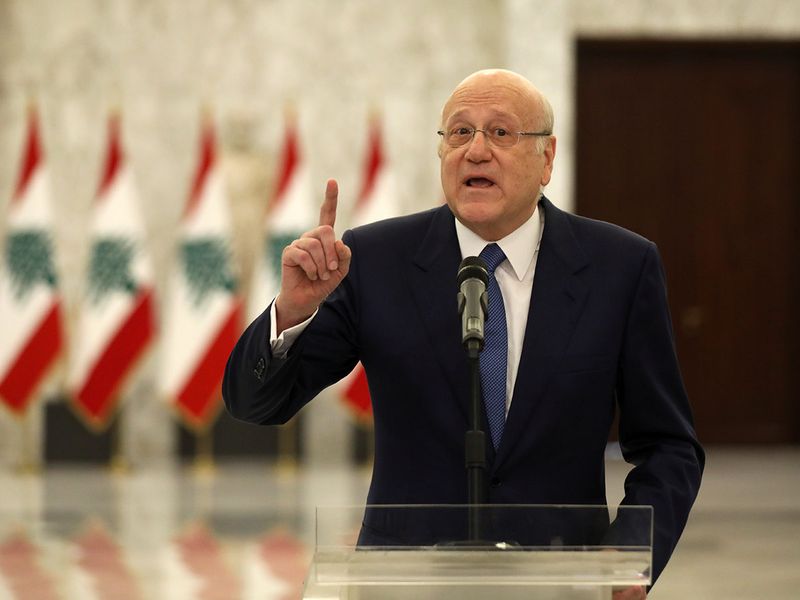
Beirut: Lebanon’s new Prime Minister Najib Mikati pledged on Friday to gain control of one of the world’s worst economic meltdowns, saying lifting subsidies would be critical for the small country’s government formed after a year of political stalemate.
Holding back tears, Mikati, one of the richest men in the country, said he recognized the pain of Lebanese mothers who cannot feed their children or find aspirin to ease their ailments, as well as to students whose parents can no longer afford to send them to school.

* Mikati served three months until an election won by an alliance of Sunni, Druze and Christian parties led by Hariri’s son, Saad.
* Mikati, 65, was nominated prime minister again in June 2011, resigning in May 2013 and staying on in a caretaker capacity until February 2014.
* The soft-spoken, Harvard-educated Mikati began building his Investcom business in the midst of Lebanon’s 1975-90 civil war.
* He sold his telecoms interests to South Africa’s MTN Group for $5.5 billion in 2006.
In 2007, he founded the M1 Group, which has various investment interests. In July, Norwegian telecoms operator Telenor sold its Myanmar operations to M1 Group for $105 million.
* Mikati served as minister of public works and transport in three cabinets between 1998 and 2004.
* Unlike many Lebanese leaders, Mikati does not hail from one of its many political dynasties, rendering him a more likely compromise candidate for premier.
* Mikati became a favourite for the post after he was endorsed by most of Lebanon’s political parties, including the powerful Iran-backed militant Hezbollah group and the other major Shiite party, Amal, led by Parliament Speaker Nabih Berri.
* Mikati was also endorsed by former Sunni prime ministers including former Prime Minister Saad Hariri, who abandoned efforts to form a government earlier this year after failing to agree with President Michel Aoun on the Cabinet’s makeup.
“The situation is difficult but not impossible to deal with if we cooperate,’’ Mikati told reporters at the presidential palace, where the new government line-up was announced.
The agreement breaks a 13-month deadlock that saw the country slide deeper into financial chaos and poverty over the past year.
Lebanon has been without a fully empowered government since the catastrophic August 4, 2020 explosion at Beirut port, which forced the resignation of then Prime Minister Hassan Diab’s government. Rival political groups had been locked in disagreement over the make-up of a new government since then, hastening the country’s economic meltdown.
The new Cabinet of 24 ministers headed by Mikati, a billionaire businessman, was announced by the president’s office, and later by the Secretary-General of the Council of Ministers, Mahmoud Makkieh. Ministers were handpicked by the same politicians who have ruled the country for the past decades, blamed by many for corruption and mismanagement leading to the country’s current crisis.
Many of them, however, are experts in their field, including Firas Abiad, director general of the public hospital leading the COVID-19 fight who has won praise for his transparency in handling the pandemic. A top Central Bank official, Yousuf Khalil, was appointed as finance minister, and Bassam Mawlawi, a judge, is the new interior minister.
*Among its first jobs will be managing public anger and tensions resulting from the lifting of fuel subsidies expected by the end of the month, overseeing a financial audit of the Central Bank, and resuming negotiations with the International Monetary Fund for a rescue package. The new Cabinet is also expected to oversee general elections scheduled for next year.
* Lebanon is in the throes of a deep economic meltdown that is threatening its stability. Its financial crisis has been dubbed by the World Bank as one of the deepest depressions of modern history.
* The crisis has propelled 78% of the population into poverty and seen the local currency lose 90% of its value against the US dollar in the past two years.
* Mikati’s cabinet now be expected to begin necessary reforms and resume negotiations with the International Monetary Fund to unlock much needed foreign aid.
Mikati, a businessman tycoon from the northern city of Tripoli, was tasked with forming a new government in July. He is widely considered to be part of the same political class that brought the country to bankruptcy. He served as prime minister in 2005 and from 2011 to 2013.
“I hope we can fulfill people’s aspirations and at least stop the collapse,’’ he said on Friday. He said the government will launch a rescue plan for the country.
It was not immediately clear what sudden compromise resulted in the breakthrough on Friday. The announcement of a new government comes after recent US and French pressure to form a Cabinet, after Lebanon’s economic unraveling reached a critical point with crippling shortages in fuel and medicine threatening to shut down hospitals, bakeries and the country’s internet.
Salem Zahran, a Lebanese journalist and political analyst, said a new government provides a “dose of oxygen’’ for Lebanese whose lives have been upended by the crisis.
“A positive shock has happened, but we have to see how the government will work, and how they will negotiate with the IMF,’’ Zahran said.
Saadeh Al Shami – Deputy Prime Minister
Abbas Halabi – Minister of Education and Higher Education
George Qardahi – Minister of Information
Bassam Mawlawi – Minister of Interior
Firas Al Abyad – Minister of Public Health
Nasser Yassin – Minister of Environment
Amin Salam – Minister of Economy
Yousuf Khalil – Minister of Finance
Ali Hamieh – Minister of Public Works
Mustafa Bayram – Minister of Labour
Abbas Al Hajj Hasan – Minister of Agriculture
Mohammad Mortada – Minister of Culture
Issam Sharaf Al Deen – Minister of the Displaced
Abdullah Abu Habib – Minister of Foreign Affairs
Johnny Qarm – Minister of Telecommunications
Walid Nassar – Minister of Tourism
Henry Khoury – Minister of Justice
Walid Fayyad – Minister of Energy and Water
Brig. Gen. Maurice Slim – Minister of Defense
Hector Hajjar – Minister of Social Affairs
George Kallas – Minister of Youth and Sports
Najla Rayyashi – Minister of Administrative Development
George Debakian – Minister of Industry
In the hours since the government formation, the national currency gained strength in the black market, rising to 15,000 to the dollar down from 19,000.
The currency has lost 90 per cent of its value to the dollar since October 2019, driving hyperinflation and plunging more than half the population in poverty.
The international community has refused to help Lebanon financially before wide reforms are implemented to fight widespread corruption and mismanagement.
'Same cooks'
Sami Nader, a Lebanese political analyst, argued there was little hope for a breakthrough if the dynamics that prevailed during the cabinet line-up negotiations remained in place.
“The continuation of quota politics and bickering over every reform and decision would mean no departure from what the caretaker government was able to do,” he said.
“It was the same cooks who formed this government, so can they offer a different meal,” he asked.
Very few of the international community’s demands for a broad programme of reforms have yet been met, hampering the disbursement of foreign assistance.
Further stalling the bankrupt state’s recapitalisation has been the government’s failure to engage the International Monetary Fund and discuss a fully-fledged rescue plan.
“The new government will have to prepare legislative elections and ensure they are held on time,” the analyst Nader said.
Parliamentary polls are due next year, with many pinning their hopes on the ballot bringing in fresh blood but others doubtful that an unchanged electoral system can change the game.
“There is practically only one door on which to knock for this government and that is the International Monetary Fund, because there is no other way out of the crisis,” Nader said.








